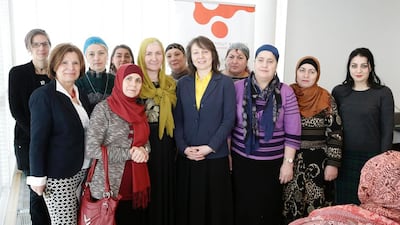We are already well aware that if ISIL was able to get hold of nuclear material, it would not hesitate to create a dirty bomb with the aim of killing hundreds of thousands of innocents. The group’s well-documented use of chemical weapons on civilians, the burning alive of a captured Jordanian pilot and countless other barbaric executions recorded on video demonstrate just where its morality lies.
Unfortunately, this is not some far-fetched plot from a bad spy movie – ISIL operatives were recently caught tracking the movements of a Belgian nuclear scientist. This explains why the Nuclear Security Summit in Washington DC that ended on Friday specifically addressed the topic of nuclear terrorism and how to ensure that nuclear stockpiles remain secure.
As president Barack Obama told the meeting, there are 2,000 tonnes of nuclear material stored with varying levels of security around the world, but it would only take an apple-sized lump of plutonium to create a devastating dirty bomb. With the UAE embarking on its peaceful nuclear programme for power generation, we were represented by a delegation led by Sheikh Abdullah bin Zayed, Minister of Foreign Affairs and International Cooperation. The UAE has vowed to ensure the highest security for nuclear material at the plant being built near Ruwais and endorsed the conference communique vowing to ensure such material never falls into the hands of terrorist groups.
All this demonstrates why the fight against ISIL and groups of its ilk has to be multifaceted and intellectually nimble. While countering terror groups on the physical military battlegrounds and the virtual ideological one of the online world, there also needs to be an awareness of unorthodox or unexpected initiatives of the kind demonstrated by the September 11 attacks on New York and Washington DC in 2001. The two-day nuclear security meeting showed this risk is being treated seriously.
But just as the risks posed by terror groups need to be addressed in a very broad sense, so too does the identification of our allies in this fight. Despite the demonisation of Muslim communities by the leading candidates for the Republican presidential nomination in the US and in other right-wing political debates across the West, the reality is that these communities are key partners in negating the small minority among them who distort the message of Islam for their own purposes.
The participation of these communities, whether in the Arab world or in minority groups in Christian-majority countries, does not simply involve being the first to identify those who are becoming radicalised, although that is important. They also play an important part in how to bring those who have responded to radical misinterpretations of Islam back into the fold.
As we also reported, about one-third of the estimated 4,000 Europeans who travelled to Syria and Iraq to join extremist groups will have returned to their home countries. For many, this will have been an educative and disillusioning experience in which the ideals or adventure they thought they were pursuing met the far messier reality of what life is like in the midst of a brutal conflict.
Whether disillusioned or not, this poses the question of how these former fighters ought to be treated. Incarceration and close monitoring is often mooted because it represents an easy way for politicians to sound tough in front of a concerned electorate, even if deradicalisation experts say an inclusive and rehabilitative approach is far more likely to keep the community safe. The reality, of course, is that there is not a single solution to a problem as complex as this and each individual’s case has be assessed on its merits.
The closest family members – and particularly mothers – have an important role to play, both preventively and rehabilitatively. So-called Mother Schools are part of a global project in which Muslim women are taught how to spot early signs of radicalisation. They already operate in Austria and Belgium, with others to open in Britain and Sweden. The civilised world will eventually prevail in the fight against terror groups, but we will do so faster if we can use all the tools at our disposal.

